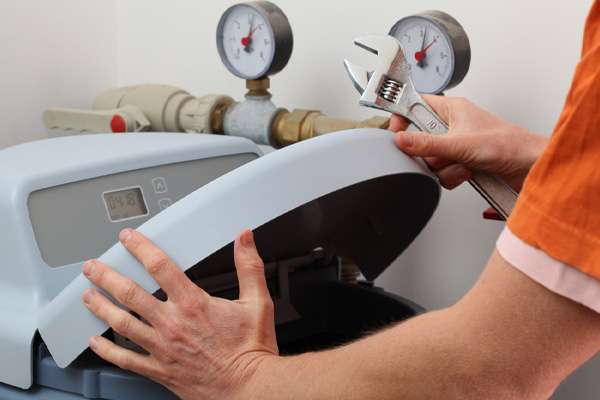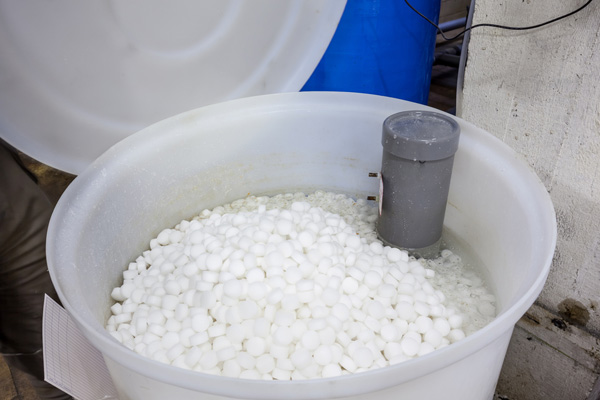
Water softeners are among one of the low-key appliances in the modern household. With the exception of setting up the device and replenishing the salt, there’s not much one needs to do. Still, there are a few vital water softener maintenance Macungie PA tasks that help enhance the efficiency and life of your water softener.
Top Tips For Water Softener Maintenance
Contents
In this article, we discuss some maintenance tips that you can use for your water softener.
Check Salt Levels Each Month
Salt is what helps regenerate the resin beads used in the softening process. Generally, the tank needs to be filled about half-full with salt. This is so that its level rises about 3 inches above the water level. While adding more salt could enhance efficiency, you need to reduce it to a lower level if old salt starts clinging to the sides.
You can check the water softener manual for information on what kind of salt you need to add. Granular salt is generally preferred. This is due to its high solubility. Since salt crystals may clog the tank, buying it in pellet form is more appropriate. There are also 3 basic grades of water softener salt, namely:
- Rock salt: While this is usually cheaper than other types, it tends to contain more insoluble impurities. Over time, these will accumulate and make the tank muddy, which would in turn affect softening efficiency.
- Solar salt: This is available in both crystal and pellet form. Solar salt is usually extracted from seawater via evaporation and is usually more soluble than rock salt.
- Evaporated salt: At 99.99% sodium chloride, this is the purest form of salt you can find. It’s also the most expensive.
Generally, look for salts of higher quality. These will leave less residue in the storage tank. Established brands will also offer products that address certain issues. This includes rust stains and iron concentration.
Break Up Salt Bridges & Dissolve Mushes

\A bridge occurs when salt forms a solid layer in the brine tank. This leaves an empty space between the salt and water. This prevents the salt from dissolving into the water. Common causes of salt bridges include temperature changes around the equipment and excess humidity. To break up these solid layers, carefully push a long broom handle around the center of the tank repeatedly. You can also pour hot water over the layers to make them easier to break.
Salt mushing, which is the more serious of the two issues, happens when dissolved salt recrystallizes to form a sludge at the base of the tank. You can use a broom handle to break the pileup, especially if it’s somewhat large. However, the best solution would be to dig out the old salt and replace it with fresh salt.
Both of these issues can be avoided by:
- Using a lesser amount of salt in the brine tank
- Opting for purer salts
- Managing the levels of humidity and temperature around the water softener.
Clean The Venturi Valve
The venturi valve and nozzle between the tanks create the suction needed to pull water in during the regeneration cycle. These parts should be dismantled and cleaned twice every year, or more frequently when the brine tank tends to get clogged. All you need to do is to unscrew the valve cover, disassemble the internal parts, and clean them thoroughly in soapy water. To reduce the risk of injury and damage to the equipment, always remember to relieve water pressure before you can dismantle the valve.
Cleaning The Resin Bed
Flushing the resin bed after every few months can help keep your water softener in top form. To do this, simply pour the amount of cleaner recommended by your water softener’s manufacturer. If your device has other issues that impair normal functioning, use a more potent cleaner. Afterwards, manually regenerate the system to keep the resin functional and efficient.
Conclusion
If your water softener isn’t working, have it checked by an expert plumber. Unless you’re well-versed in working with a handful of mechanisms, a DIY plumbing repair on your device isn’t something you should attempt. However, always follow the manufacturer’s instructions when handling the equipment.
It is recommended that you contact a plumber when your water softening system starts acting up. Only a plumber will be able to determine if the issue requires a repair or a water softener replacement. When hard water sediment builds up, it causes major damage to your pipes and home. For a reputable plumber, be sure to contact Robinson Plumbing. We offer repairs, maintenance, and installs for water softeners, with a proven track record of offering expert plumbing services to residents of the Lehigh Valley.
Call Robinson Plumbing For All Of Your Plumbing Requirements

Contact Robinson Plumbing, one of the most trusted plumbing companies in the Lehigh Valley, for reliable plumbing services. We have lots of plumbing services ranging from water softener installs, toilet repairs and replacements, faucet upgrades, water leak repairs, clogged drain repairs, and more. We always give a wide range of solutions when possible for any plumbing repairs. This allows you to choose the best options for your budget and home.
We proudly offer the most affordable and best plumbing services in the Lehigh Valley area. Our plumbers all have the proper licenses and expertise to ensure your satisfaction. All of our work is backed with a guarantee. Contact Robinson Plumbing today and schedule your free estimate.
Call us today at (610) 351-9889 or click here to contact us for any questions that you might have!
